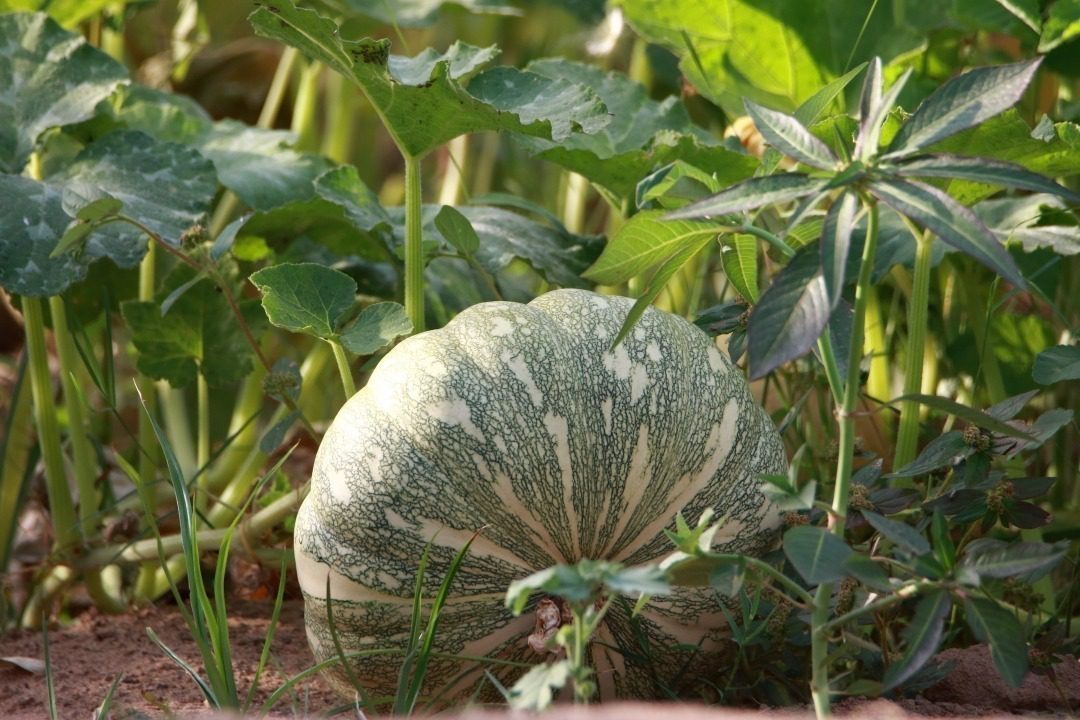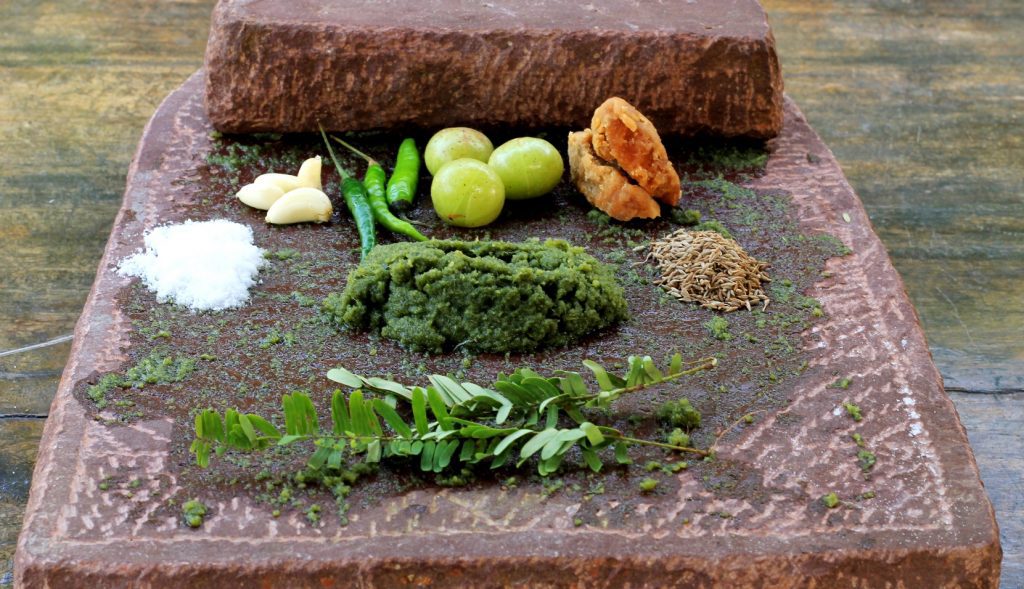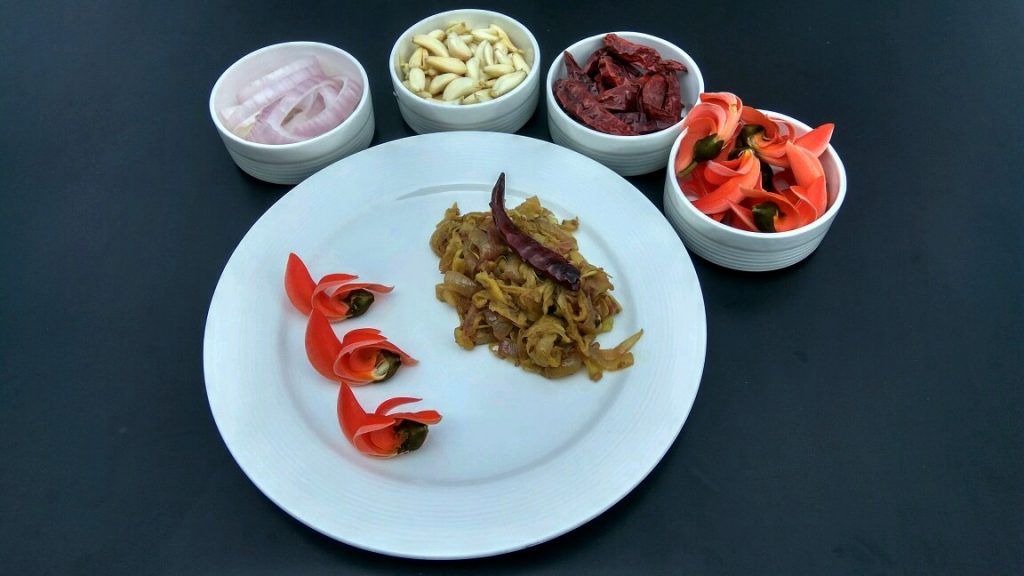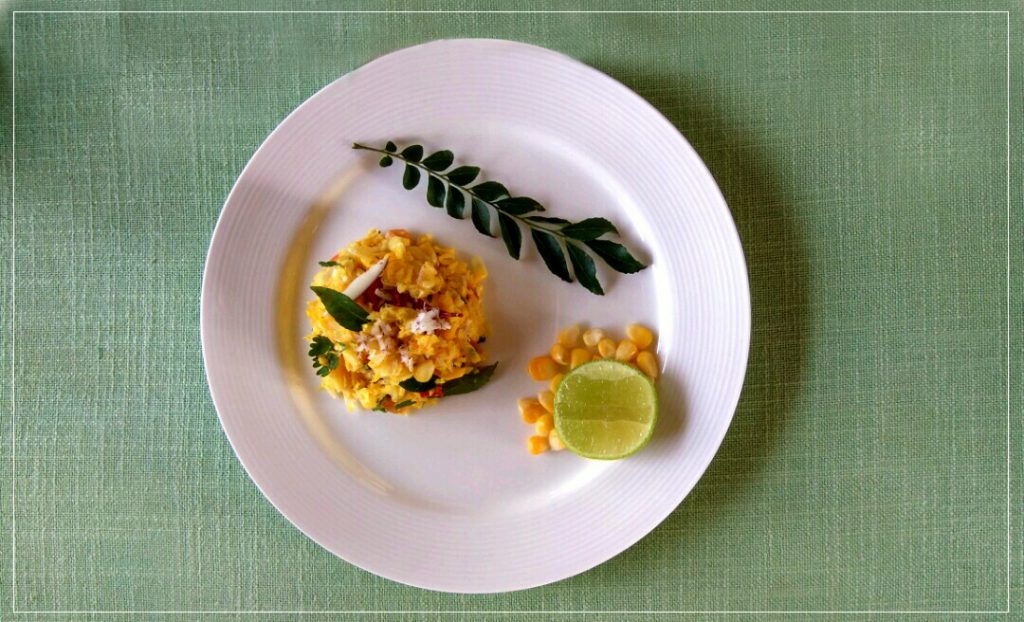As you sit in the serene organic garden of Bandhavgarh National Park, you can watch butterflies and birds flit about. The morning is alive with the shrill calls of awakening birds. The hunt for Organic food in India begins right here, within the garden and all around it.
A gigantic hornbill drops by to steal a tomato. The orange thrush searches the undergrowth for some worms. The bee-eaters have their timings set for hovering around, to capture some of the bees and dragonflies that are in their multitudes, pollinating the flowering plants that are arranged in neat beds right next to the vegetable patch.
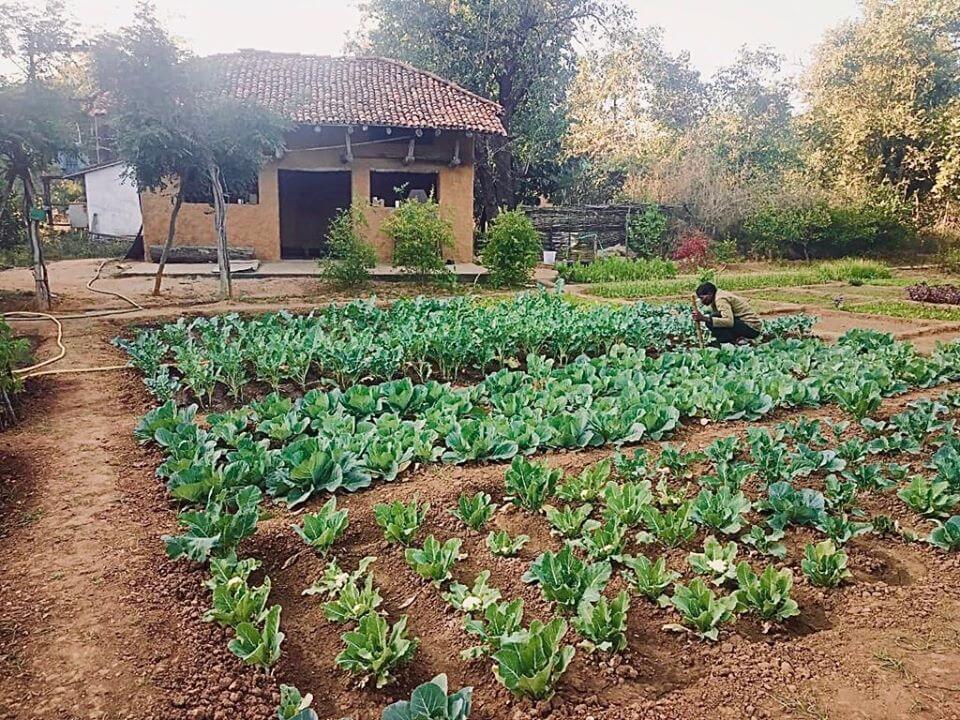
Head off the property and the farms next door are almost bereft of the magical world of birds and insects that play a major role in the growth cycle of life.
I am reminded of that song by Elton John asking someone to come play with him in his magic garden, and the song Lemon Tree as I walk past the lime trees bursting with fragrant limes. You would too when you sit under the gigantic umbrella-like shed that is in the centre of the garden at Kings Lodge or the village house in Pench and Kanha.
They’re almost magical… those moments in time. On my last few trips to Kings Lodge I carried with me some heirloom tomato seeds and purple beans and handed them over to Shyamlalji, the gardener. Seeing them growing on my next visit was a joy unparalleled, and brought with it a far greater sense of belonging than I’ve ever felt anywhere else before.
We owe our meals to the farmer, both the man and the insects and the wildlife that make it all happen, for without the co-existence of both nothing shall come to pass.
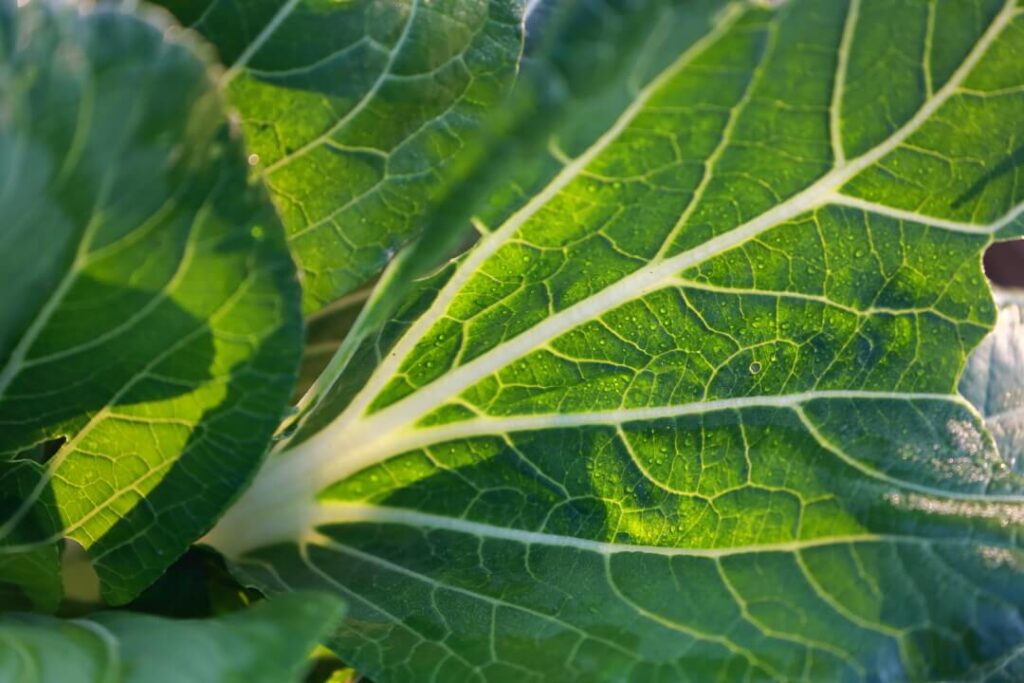
What is Organic Food?
The term was first coined by Lord Northbourne in 1939. Simply put, it is a holistic approach to farming.
Chef Jose, Executive Chef points out, “Even while organic is now relatively common food terminology, it is the distinct difference in the taste, flavours, and awareness, that the food one is consuming, is free of genetic modification or chemical treatment of any kind. Organic means good, clean and fair: Good in terms of taste, clean in terms of environmental sustainability, and fair, in terms of price and value for the people who produce it.”
Organic farming follows certain production standards, namely, the absence of chemicals and the use of natural pesticides.
The adage: ‘Know Your Farmer, Know Your Food’ gives a personal dimension to the whole process. It’s endeavour is to promote the principles of Organic Farming as the principles of health, ecology, fairness and care. Agriculture is one of mankind’s most basic activities, and the principles are embedded in the way we live, our outlook upon life, our health, and the health of the ecosystem at large. Someone put it very well when they said, ‘It is not simply the absence of illness, but the maintenance of physical, mental, social and ecological wellbeing.’
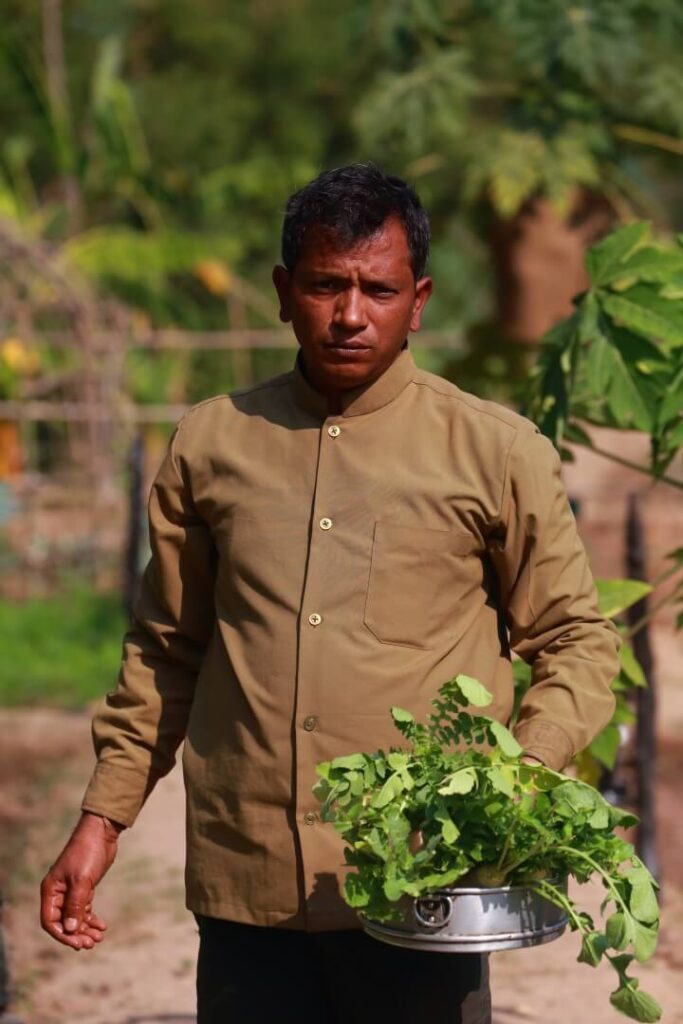
Is Organic Produce too Expensive?
While one may think that organic produce is way to expensive in the markets, to make it popular one needs to bring it to a parallel pricing point. So is the price just?
Due to the lack of volume, Organic food is often priced between 10% to 60% higher than that for regular produce. Too expensive, also means a change in the dimension of one’s shopping budget would be considerable, if one were to shop just for organic produce.
But if one were to sit quietly and observe the sheer effort that someone like Shyamlalji puts in on a single day and then imagine that effort, care, love and respect being put in without a break for 365 days, year after year, one would realize that the price we pay for organic produce is appallingly low.
In times of recession it’s all about targeting high-end users. The change has been happening, from terrace gardens, to bankers and professionals turning to gardening and growing their own produce for themselves and for sale.
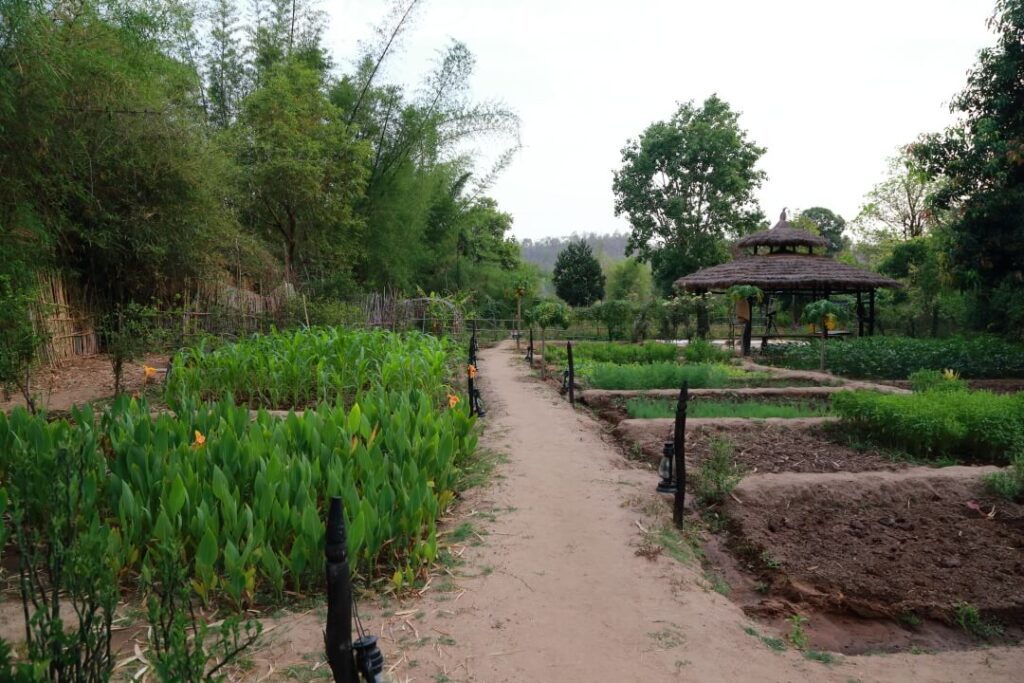
The Future of Organic Farming
The global market for Organic foods is around $26 billion and slated to hit $102 billion by the end of 2020. With over a billion rupees earmarked by the Indian Government for the promotion of sustainable agriculture, two bodies have been created to establish a system of certification. NPOP (National Program for Organic Production) and the APEDA (Agricultural and Processed Food Development Authority) the main agencies to promote food export.
The conversion from chemically treated land, to Organic farming takes three years.
The International Federation of Organic Agriculture Movements (IFOAM) mentions that “Organic agriculture should be based on living ecological systems and cycles. These should be emulated and sustained. Systems are universal, but must be adapted to suit climate structures of areas and the culture and scale of operations. Factors like recycling, materials and energy management help sustain and benefit habitats, air, water and biodiversity.”
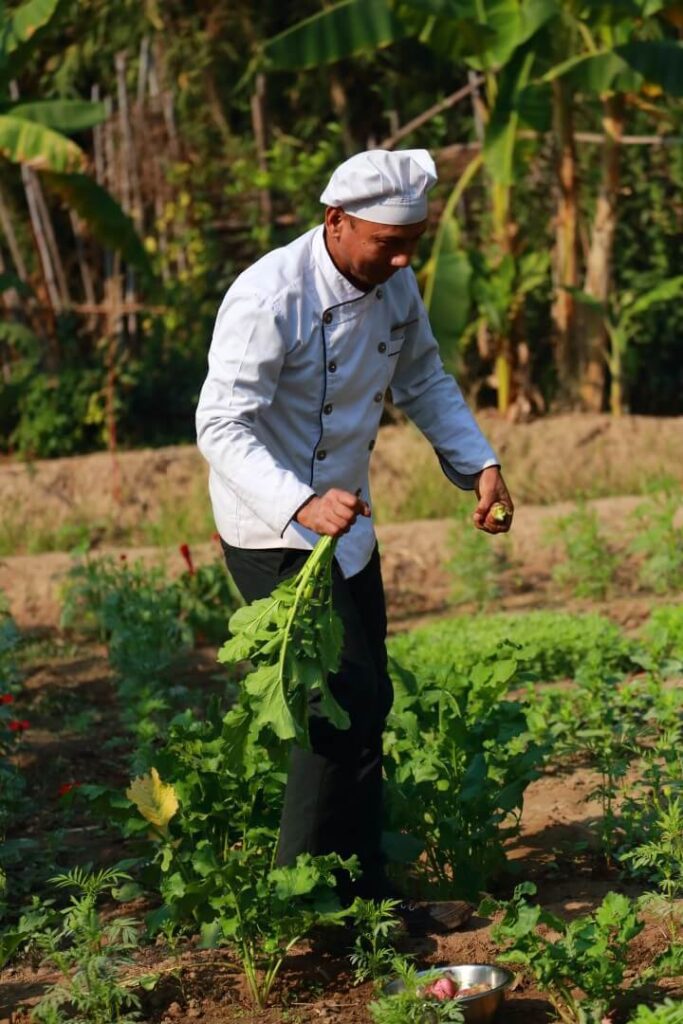
While there are no governmental initiatives towards organic endeavours at the moment, the changes that are happening in the world today see a huge leap towards going organic in simple ways; like using natural pesticides such as neem and ash to protect one’s crops.
Watching Shyamlalji and his assistants carefully tending the organic farm is amazing; it almost transports one to a different time and era. When a blizzard or hailstorm trashes the garden to blitz, it was felt through the resort. Even more than the destruction of the plants, it was of the heartbreak you feel of something you had nurtured and nourished, getting destroyed.
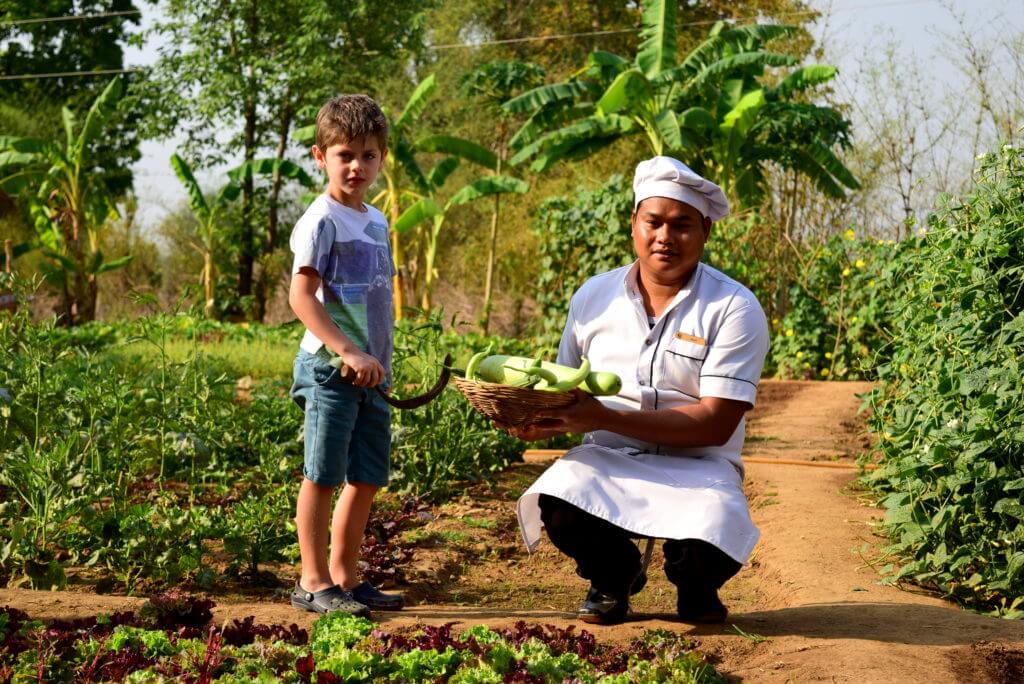
At Kings Lodge we grow our own herbs like wild mint, basil, dill on the property, along with tomatoes, pumpkins, carrots, radish, cauliflower, zucchini and eggplant (brinjal). The latest addition has been micro-greens for salads, breads and parathas, besides just making a dish look pretty.
The economics of using organic produce just does not justify the creation of complete meals as yet, maybe in the near future it will. Creating exotic dishes out of simple ingredients and changing mindset of consumers will bring about a change, but with time.
Breakfast dishes of fresh papaya and fruit from the garden, to roasted and stuffed green heirloom tomatoes, pumpkin soup or desserts using the vegetables and fruits grown in the garden has become a way of life in the Pugdundee kitchens. And none of those dishes are difficult or complicated. They can be made easily in any kitchen if one were to simply pay attention to the cooking process.
The bottom line is, one’s health is in one’s hands. One must create a demand for food that is environmentally safe for animals, the land, forests and people. It is healthy, nutritious and above all can be made economically viable.
Chilled Pineapple & Almond Soup

Serves 4 – 6
With the sweltering summers one craves something cold and refreshing and the season of chilled soups is upon us. Here is a recipe from my latest book, Masala Dabba. This is a chilled soup that couples the weight-reducing properties of pineapple and dried ginger with the subtle richness of almonds to add body. I enjoy it as a cold soup, but it can also be enjoyed as an aperitif. Feel free to substitute skimmed milk with soya, almond or coconut milk in case of a dairy allergy. In case of a nut allergy, substitute almonds with melon seeds.
Ingredients:
2 large ripe fresh pineapples, diced 5 - 6 cups water 1 teaspoon dried ginger powder ½ teaspoon white pepper powder ½ cup almonds, blanched and peeled 1 cup skimmed milk salt to taste 1 dried red chilli, cut into slivers for garnish (optional) 6 - 8 rose petals, for garnish (optional)
Method:
- Combine the pineapples with 5 to 6 cups water, ginger powder and white pepper powder in a saucepan and place over medium-high heat. Bring to a boil, reduce the heat and simmer for 5 minutes till the pineapple is pulpy. Remove from heat and cool to room temperature.
- Meanwhile, combine almonds with milk in a blender and purée till smooth. Add the cooled pineapple mixture with the liquid and blend till smooth.
- Strain into a large bowl, mix in salt and refrigerate to chill.
- Ladle chilled soups into individual bowls (or small glasses), garnish with chilli slivers and rose petals. Serve, refreshing the soul.
Peach Malpuas

Ingredients:
FOR MALPUAS 1½ cups all-purpose flour (maida) 3⁄4 cup grated khoya (creamy, coagulated milk solids) 1¼ cups whole milk 1⁄2 teaspoon white pepper powder Clarified butter (ghee) for shallow-frying 2 tablespoons honey FOR PEACHES 8 canned peach halves 1 teaspoon fennel seeds (saunf)
Method:
- For malpuas, whisk flour, khoya, milk and pepper together to make a smooth batter. Cover and set aside for 20 minutes.
- Brush a frying pan liberally with clarified butter and heat over a medium-low heat. Using a spoon, drop some batter in the centre of the pan and spread to make a 4-inch disc. Drizzle clarified butter around the edges and fry till golden on one side. Flip over and drizzle more clarified butter around the edges. Reduce the heat to low and cook till golden on both sides and done. Remove onto a plate. Repeat with the remaining batter.
- Drain the peaches and reserve 1 cup syrup. Cut the peach halves into wedges.
- Combine the peach syrup with fennel seeds in a pan and bring to a boil over medium heat. Add peaches, reduce heat to low and simmer for 2 minutes.
- To serve, place a malpua on each serving plate and brush with honey. Carefully lift a couple of peach wedges and place on the malpua. Cover with another malpua. Repeat to make a stack of 3 malpuas topped with peaches.
- Serve warm.
Written by: Michael Swamy, Chef | Food Media Specialist | Wildlife Photographer | Traveller | Film Producer Author and 3 Time Gourmand Award winner
Visit our the Luxurious Lodges in Different location:
The Best Resort in Kanha National Park, Luxury Resort in Tadoba, Resort in Bandhavgarh National Park, Resort in Pench, Resorts in Satpura, and Panna to watch various fascinating species of the forests frolic in the untamed wild.
Get in touch with our trip curators at Pugdundee Safaris to book your next wildlife holiday.
Our trip curators at Pugdundee Safaris are more than happy to assist you. Phone: +91-011-40132680 Email: enquiry@pugdundeesafaris.com

